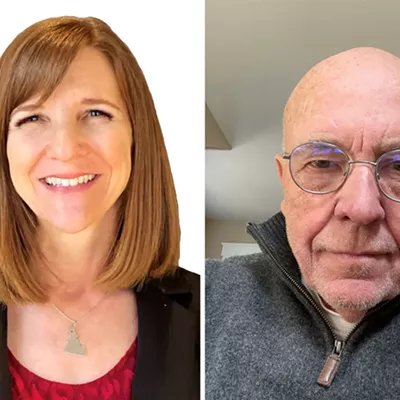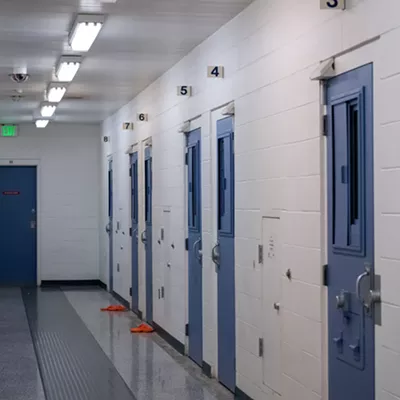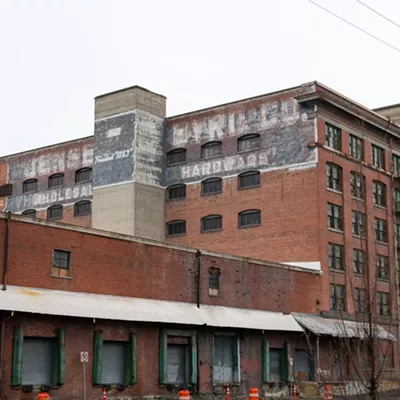Nadine Woodward is flush with cash.
With pride, Spokane's mayor announced last week that her reelection campaign has raised more money than any other candidate in Spokane election history.
The previous record holder was former Mayor David Condon, who raised $395,000 during his run in 2015.
But Condon's take was during the entire primary and general election season. Woodward broke his record two weeks before the Aug. 1 primary. The November general election is still three long months away.
There are some caveats: Condon's fundraising total is higher than Woodward's when you account for inflation. And the amount of money an individual can donate to a single candidate during primary and general elections has increased in recent years, from $1,000 in 2015 to $1,200 today.
But still, it's a significant amount of money for a Spokane mayoral race, says Jim Hedemark, who has spent decades working on local campaigns as a political consultant. (He isn't working for any candidates this year.)
Hedemark also notes that Woodward's main opponent, longtime Democratic politician Lisa Brown, has also been raising some big amounts of cash. She's reported raising $267,893, which puts her in seventh place on the list of Spokane mayoral candidate's fundraising records.
"All things being equal, Lisa Brown's over a quarter of a million ain't too shabby," Hedemark says.
The spending gets even wilder when you add in independent expenditures. State law limits how much individuals can donate directly to candidates, but there's nothing stopping someone from giving stacks of money to a political action committee. The PAC can then spend that money supporting a candidate while still technically remaining independent of that candidate's campaign.
The Spokane Good Government Alliance, for example, has already spent more than $100,000 supporting Woodward's campaign. So has the National Association of Realtors. If you get an unsolicited campaign flier in the mail, check the fine print at the bottom. There's a good chance it came from one of those two PACs.
All together, this year's mayoral race has already generated more than $900,000 in spending.
"At this point in the election, people are voting with their wallets," Hedemark says. "They are, to use the old Chicago party boss adage, voting early and often."
Woodward frames her fundraising record as a win.
"It's an honor to have so much support throughout this community," she said in a statement last week.
Brown sees it differently. She has a larger percentage of small-dollar individual donors, and she noted last week that many of Woodward's donors are business interests.
A similar dynamic is true in this year's City Council races, which have also attracted some big amounts of money.
The conservative candidates in each of the four council races have fundraising leads over their opponents. They have financial support from Realtors, property owners and homebuilding organizations.
More progressive candidates have less overall money, but tend to have a higher number of small donations and financial support from labor organizations and progressive groups like Fuse Washington.
Almost all of the independent expenditure money is being spent on conservative candidates. The National Association of Realtors has spent $40,000 on Earl Moore in District 3, $43,000 on Katey Treloar in District 2, and $99,000 on Kim Plese for council president. The money has gone toward ads on CNN and Fox News, direct mailers, digital ads, phone calls, and text messages in support of the Realtor's chosen candidates.
The Spokane Good Government Alliance has spent a combined $33,000 on Treloar, Moore, Plese and Council member Michael Cathcart, who is running for reelection against just one challenger, so won't be on the ballot until November.
The alliance also spent $18,000 on attack ads against Brown and Betsy Wilkerson, who is running against Plese for council president.
John Powers, who was mayor of Spokane from 2000 to 2003, says he's concerned about the growing influence of special interest spending and independent expenditures in city races. He doesn't remember anywhere near this much money floating around back when he ran for office.
Powers was particularly concerned about a direct mailer the Spokane Good Government Alliance paid for earlier this month that accused Wilkerson and Brown of "endangering our community by emboldening criminals," and tried to tie them to the "defund the police" movement. (Both candidates say they want to see the police department fully staffed and funded.)
"I thought it was kind of fearmongering and just dog whistle kind of stuff," Powers says. "It was not what you build community around."
The mailer suggested voters choose the "candidates who will put your family first" — namely Woodward, Plese and Treloar.
Treloar had been publicly endorsed by Powers. But after the mailer went out, he "quietly and respectfully" asked her to remove his name. Powers stresses that he has nothing against Treloar — he still has a lot of respect for her and thinks she's a strong candidate. He was just uncomfortable being tied to a candidacy being boosted by negative attack ads bought by big independent expenditures.
Several of the people and groups who have donated directly to candidates have also put money toward the Good Government Alliance: Washington Trust Bank, business owner Alvin Wolff Jr., and the Spokane Home Builders Association have each given at least $10,000.
Local developer Larry Stone appears to be this year's biggest election spender. He gave the Good Government Alliance $30,000 and has also been bankrolling a PAC called Clean and Safe Spokane, which is advocating for a ballot measure this fall that would prohibit encampments in much of the city.
Stone has put $75,000 toward Clean and Safe Spokane. Much of that money went to a political consulting company that organized signature-gathering efforts to get the citizens' initiative on the November ballot.
Stone also gave money to conservative candidates directly, but the candidates returned his donations because of confusion over whether or not the city's fair elections code applies to him. That anti-corruption law prevents city contractors from donating to candidates, and Stone made $330,000 this year by leasing a warehouse on Trent Avenue to the city for use as a homeless shelter.
But last week, city lawyers found that he doesn't meet the definition of a "contractor" and isn't subject to the campaign finance law. They had the same conclusion for Michelle Hege, who owns a public relations firm that does marketing for the city parks department and donated to Brown's campaign. In an email, Stone said he wasn't familiar with the election code decision and wouldn't comment on it. ♦
























